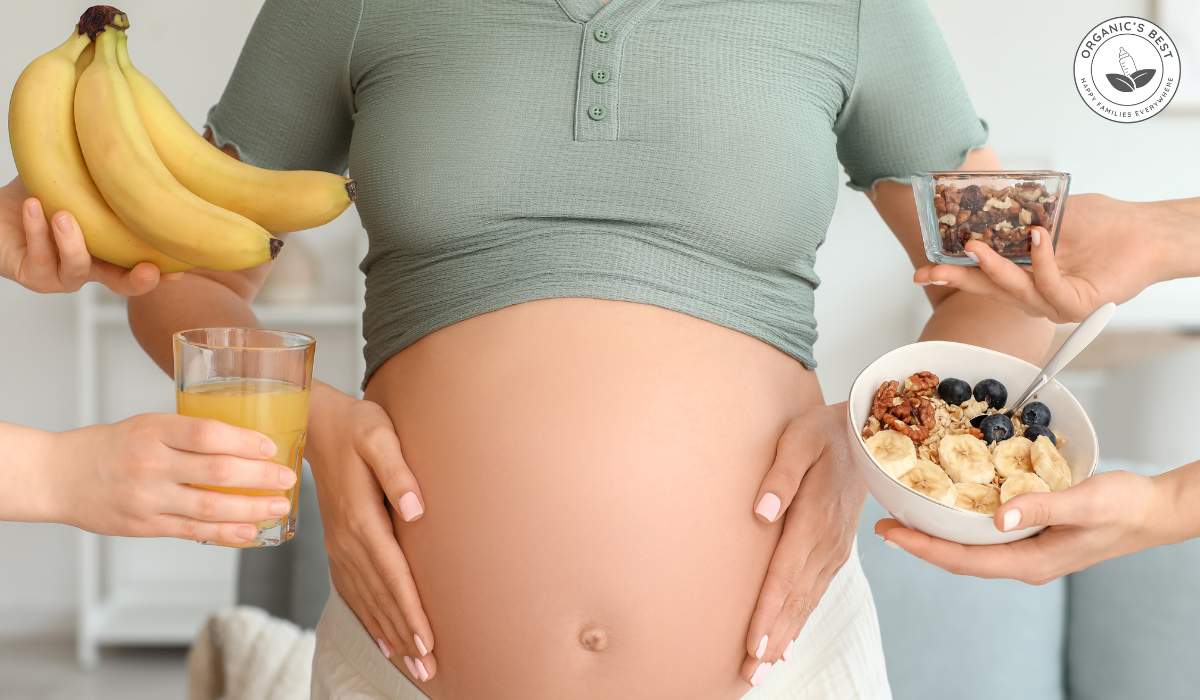Click to Get 2 FREE Boxes/Cans
Only New Customers! Click HERE to Get 2 Extra Boxes/Cans for Free With Your First Order.
BABY FORMULA
Offering new parents top-quality European infant formula from renowned brands like HiPP, Holle, Kendamil, and more. If you’re uncertain about which product to choose, our Formula Finder can help you make the best decision for your baby.
Baby Food
Offering new parents a premium selection of European baby foods, including jars, pouches, cereals, and snacks from esteemed brands like HiPP and Holle.
Understanding Baby Poop: Types, Color Chart Included
by Agustina Fernandez February 11, 2025 9 min read

Baby poop may not be the most glamorous topic, but for parents, it's like a built-in health report. The contents of your baby's diaper can tell you a lot about their digestion, hydration levels, and even potential food sensitivities.
During the first year, as your baby's diet and digestion matures, their poop habits can change frequently. Understanding what's normal and what isn't can give you the confidence you need in caring for your little one.
Join us as we dive deep into the diaper! We will cover what healthy baby poop looks like, how often you should expect it, and when it might be wise to consult your pediatrician.
Table of Contents
Normal Baby Poop: Frequency and Consistency
The number of bowel movements your baby has is influenced by a few factors, primarily age, diet, and feeding frequency.
Below, you'll find various scenarios that influence your baby's bathroom habits.
Newborn Baby Poop
In the first few days and weeks of life, you can expect a lot of newborn poop, with bowel movements happening frequently and pretty quickly after a feeding. This is completely normal as their digestive systems adjust to life outside the womb.
The first newborn poop is called meconium, which is a sticky, dark green, or black substance that is made up of cells, protein, fats, and intestinal secretions.
Babies usually pass meconium in the first 24 hours while still in the hospital, but for some, it takes them up to 2 days. This is a sign that their digestive system is beginning to work. Once the meconium is cleared, newborn baby poop will begin to change.
Watching for a clean diaper is just as important as noticing what's in a dirty one. If your baby hasn't pooped in 24 to 48 hours, especially in the first month, or seems uncomfortable, it's a good idea to check with your doctor. While occasional irregularities are normal, it could mean that they are constipated or have a feeding issue that needs attention.
Breastfed Baby Poop
Breastfed baby poop is often described as mustard-yellow with a seedy or curdled texture. This stool is typically soft or runny and can be quite frequent in the early days.
Some breastfed babies may poop after every feeding, while others may only go once or twice a day. This variation is completely normal, and as long as your baby is gaining weight and seems comfortable, there's no need to worry about frequency.

Interestingly, breast milk is highly nutritious and quickly digested, so a breastfed baby's stool is often lighter in odour. You may notice a mild, almost sweet smell, which is quite different from the stronger smell of formula-fed poop.
Formula-fed Baby Poop
On the other hand, formula-fed baby poop is usually firmer and more formed. Their baby poop is typically tan, yellow, or brown, and the texture is thicker than that of a breastfed baby. The smell is also noticeably stronger, often described as more pungent, due to the different composition of formula compared to breast milk.
Formula-fed babies typically poop once or twice a day, though some may go every couple of days. This is normal as long as their stool is not hard or dry.
What About After Starting Solids
Once your little one starts solids, the frequency will depend on diet and overall gut health, but expect a shift toward more formed stools.
What Do Baby Poop Colors Mean?
Baby poop comes in a variety of colours, and while some baby poop colours are perfectly normal, others may warrant a closer look.
Green/Dark Green Baby Poop
Green baby poop is typical in formula-fed babies and is usually nothing to worry about. However, if a breastfed baby's stool is green, it could suggest they are getting too much foremilk (the milk at the start of a feeding, which is lower in fat and higher in lactose), or it may indicate a mild intolerance to something in the mother's diet. If the green baby poop persists or your baby shows signs of discomfort, it's worth checking with your pediatrician.
White Baby Poop
White baby poop isn't super common and may point to an issue with the liver or gallbladder, such as biliary atresia, a condition where bile doesn't flow properly. White stools should be evaluated by your doctor as soon as possible, as they can signal a serious medical condition that requires prompt attention.
Yellow Baby Poop
Yellow stools are perfectly normal for both breastfed and formula-fed babies. For breastfed babies, the poop tends to be soft and mildly sweet-smelling. Formula-fed babies' stools may also be yellow but can have a slightly firmer texture and a stronger smell. Yellow stools indicate healthy digestion and often indicate that your baby is getting the proper nutrition.
Orange Baby Poop
Orange poop is generally normal for breastfed babies, especially as they begin to introduce new foods or when they have certain types of milk. However, if your baby's stool is bright orange or accompanied by other symptoms such as a rash or excessive gas, it could indicate a food allergy or intolerance.
Red Baby Poop
Red poop can be alarming, but it doesn't always signal something serious. It can be a result of a food allergy, especially if your baby has recently been introduced to new foods. Sometimes, the red colour is due to blood in the stool, which can come from constipation or minor tears in the anus. However, red poop could also indicate gastrointestinal (GI) tract bleeding. If you see red stool or if your baby seems unusually fussy or in pain, it's important to consult your doctor right away.
Black Baby Poop
Black stool is very common in newborns during the first few days as they pass meconium, a thick, tar-like substance that's normal in the first 48 hours. After that, black stool could indicate that your baby's diet contains iron supplements, which often turn poop black. If the baby is not on iron-fortified formula or iron supplements, black stool past the first week is more likely to indicate bleeding in the GI tract, meriting an immediate pediatric consult.
Gray Baby Poop
Gray baby poop is rare but can occur, especially once your baby has started eating solid foods. While grey stool can sometimes be a sign of a liver or gallbladder issue, it could also happen due to the introduction of certain foods, particularly those rich in fats. If the stool is grey and accompanied by other signs like jaundice or poor feeding, it's best to check with your pediatrician.
Baby Poop Color Chart
Here's a quick baby poop guide to help you understand what each colour of baby poo might mean.

What Are the Types of Baby Poop?
Outside of the colour, baby poop consistency can vary. Let's discuss the most common textures below and what they might say about a baby's digestive health.

Stringy Baby Poop
If your baby's poop appears stringy, slimy, or mucus-like, it is often linked to increased saliva production, which happens when babies are teething. It can also be a sign that your baby is fighting off a mild illness, as extra mucus in the digestive tract can end up in their diaper.
In some cases, persistent stringy poop may indicate a mild food intolerance or sensitivity, especially if accompanied by other symptoms. In particular, cow's milk protein allergy (CMPA) baby poop can contain extra mucus.
Foamy Baby Poop
Foamy or frothy poop is often seen in breastfed baby poop and can be a sign of a foremilk-hindmilk imbalance. Foremilk is the thinner, more watery milk that comes first during a feeding, while hindmilk is thicker and richer in fat.
If a baby gets too much foremilk and not enough hindmilk, it can lead to greenish, bubbly stools and gassiness. To help balance this, try keeping your baby on one breast longer before switching to the other, allowing them to fully drain it and get a good mix of both foremilk and hindmilk.
Pebble-like Poop
When a baby's poop is hard, dry, or shaped like small pebbles, it usually alludes to constipation. This can happen if your baby is slightly dehydrated, transitioning to solid foods, or not getting enough fiber in their diet.
If you notice your baby straining during bowel movements or having infrequent, firm stools, consider increasing their fluid intake. For babies on solids, offering more fiber-rich foods, such as pureed prunes, pears, or peaches, can help soften stools and keep things moving more comfortably.
When Should You Be Concerned and See a Doctor?
While baby poop colours and textures can vary, there are some telltale signs to look out for that point to something not being right.
Blood in Baby Poop
Small streaks of blood in your baby's stool may be caused by minor irritation, such as straining during a bowel movement or a small anal fissure. Occasional flecks aren't usually a cause for concern, but frequent bleeding and larger amounts of blood should be evaluated by a doctor.
Mucus in Baby Poop
A small amount of mucus may be expected, especially in newborn poop, as their digestive system adjusts. However, frequently noticing thick, slimy, or stringy mucus may indicate an infection, food intolerance, or an underlying digestive issue.
Babies with cow's milk protein allergy (CMPA) or other food sensitivities often pass mucus-filled stools, sometimes accompanied by blood. Persistent mucus, especially when paired with diarrhea, excessive gas, poor weight gain, or fussiness, should be discussed with a doctor to determine the underlying cause.
Worms in Baby Poop
Worms in a baby's stool are rare but can appear as thin, white, thread-like strands or tiny moving specks. Babies may contract parasites in baby poop through contaminated food, water, or close contact with infected individuals. Signs include anal itching, bloating, irritability, trouble sleeping, or digestive issues.
A doctor can confirm the diagnosis with a stool test and recommend treatment, as untreated parasites may impact nutrient absorption and cause discomfort.
Infant Diarrhea and Constipation
At some point in your parenting journey, you'll likely deal with either diarrhea or constipation. Whether it happens early on or after your little one starts solids, their digestive system is bound to react to something unexpectedly. When that happens, you may notice one of the following:
-
Diarrhea: Runny, frequent, and possibly green or yellow. Could signal an infection, allergy, or sensitivity. If your baby has diarrhea, it's important to consult with a pediatrician to determine the cause. Frequent diarrhea with signs of dehydration, like sunken eyes or fewer wet diapers, requires immediate medical attention.
-
Constipation: If your little one is constipated, their baby poop will likely be hard, dry, and pebble-like. Formula-fed babies are more prone to this, and it can be fairly common for it to happen when transitioning to solids.
If either of these problems persists, you may need to make a change to their diet. If your little one is formula-fed, that could look like switching products to something more suited to sensitive tummies.

Formula Options for Constipation
HiPP Dutch
HiPP Dutch Combiotik formula can support babies with constipation thanks to its gentle ingredients like prebiotics and probiotics that promote healthy digestion and a balanced gut microbiome. The prebiotic GOS in the formula has been found to create stool consistency and frequency similar to that of breastfed infants. Moreover, it excludes starch and maltodextrin, using organic lactose as the only carbohydrate for easier digestion.
HiPP Comfort
Designed for babies with constipation, gas, and lactose-related colic, HiPP Comfort contains hydrolyzed proteins and lower levels of lactose for easier digestion, beta palmitate to soften stools, and probiotics (only in the German version) to support gut health. Like HiPP Dutch, the formula is enriched with prebiotic GOS, contributing to healthier bowel movements.
Holle Goat
Holle goat milk formula features gentle A2 proteins for easier digestion. Organic goat milk enhances digestive comfort and is high in naturally occurring oligosaccharides that have prebiotic effects to support a healthy gut.
Formula Options for Diarrhea
Goat Milk Formula
First and foremost, in the case of diarrhea, you should consult your pediatrician to evaluate the cause. Depending on the cause, they recommend a goat milk formula, which tends to have less lactose and contains easier-to-digest proteins. Holle Goat, HiPP Goat, Kendamil Goat, or Jovie formula are great options.
HiPP HA
If the diarrhea is due to a cow's milk intolerance, your pediatrician may suggest a hypoallergenic formula. HiPP HA is a great option, offering easy-to-digest milk proteins along with prebiotics and probiotics (excluding ready-to-feed versions) to support your baby's gut health. However, we encourage you to consult a pediatrician before using this specialty formula, as it may not be suitable for all babies with CMPA.
Infant Poop FAQs
If you're looking for short, straightforward answers to some of the questions above, you've come to the right place.
How Many Times Should a Baby Poop a Day?
Newborns can go after every feed, but the frequency typically slows down over time. By six months, once or twice a day is common.
What Does Lactose Intolerant Baby Poop Look Like?
If a baby is lactose intolerant, their baby poop will likely look watery, frothy, and greenish with possible mucus. Other signs, like bloating and excessive gas, may also point to lactose issues. However, true lactose intolerance (or lactase deficiency) is rare in infants.
What Does Allergy Poop Look Like?
If a little one has a milk protein allergy or intolerance, their baby poop will likely look blood-streaked, mucus-filled, or unusually green.
What Does Unhealthy Baby Poop Look Like?
Unhealthy baby poop can look like frequent diarrhea, black/tarry stool past the meconium stage, white or grey stools, or visible blood. A doctor should promptly check these concerns.
|
Disclaimer: Please be aware that this information is based on general trends in babies, and it is not medical advice. Your doctor should be your first source of information and advice when considering any changes to your child’s formula and when choosing your child’s formula. Always consult your pediatrician before making any decisions about your child’s diet or if you notice any changes in your child. Breastfeeding is the best nutrition for your baby because breast milk provides your child with all the essential nutrients they need for growth and development. Please consult your pediatrician if your child requires supplemental feeding. |
Agustina Fernandez
Dr. Agustina Fernandez earned her medical degree from the prestigious Universidad Nacional de Córdoba, Argentina. With a deep-rooted passion for pediatrics, Dr. Fernandez is currently on the path to specializing in children's healthcare. Recently, she has delved into the vital field of infant nutrition. Her research interests include breastfeeding, infant formula, and baby food in little ones’ formative years. Dr. Fernandez's commitment to this area of study underscores her dedication to ensuring the health and well-being of children from their earliest days.
Leave a comment
Comments will be approved before showing up.
Also in Organic Infant Nutrition and Health Blog

Screen Time for Kids: The Effects Of Letting Babies And Toddlers Use Smart Phones
by Agustina Fernandez October 21, 2025 7 min read
Read More
Screen Time for Kids: The Effects Of Letting Babies And Toddlers Use Smart Phones
by Agustina Fernandez October 21, 2025 7 min read
Read More
Pregnancy Diet: Best Foods to Eat While Pregnant
by Agustina Fernandez October 15, 2025 9 min read
Read More
Reviewed by Dr. Bardha Citaku, MD
-

Dr. Bardha Citaku: Medical Reviewer of Organic's Best Blog
Dr. Bardha Citaku completed her medical studies at the University of Prishtina in Kosovo, where she began her journey into the field of medicine. She has since developed a career in medical research, contributing to projects with notable organizations, including the World Health Organization (WHO).
